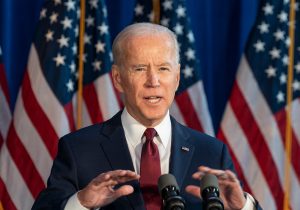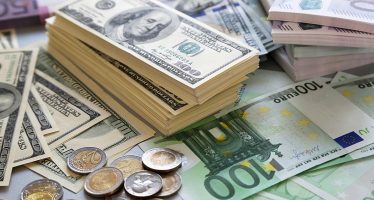Joe Biden No Panacea to Global Trade Troubles
 The imminent departure from the White House of the self-styled dragon-slayer does not necessarily bode well for Chinese President Xi Jinping. Though the incoming Biden Administration is expected to take a less ideological approach to international trade, a reappearance of pragmatism may not herald a return of the relatively relaxed attitude towards China’s more questionable trade practices.
The imminent departure from the White House of the self-styled dragon-slayer does not necessarily bode well for Chinese President Xi Jinping. Though the incoming Biden Administration is expected to take a less ideological approach to international trade, a reappearance of pragmatism may not herald a return of the relatively relaxed attitude towards China’s more questionable trade practices.
During this year’s election campaign, Trump and Biden clashed violently on most topics, but China was the exception. The rhetoric shared by both candidates delivered an unambiguous ‘America First’ message that promised to exclude Chinese companies from government procurement processes, prioritise US manufacturers, and encourage the reshoring of production lines. The delivery style of the message differed; its substance did not.
Where Trump moved unilaterally on most, if not all, trade issues, his successor is expected to reach out and engage with others. There are early signs that the new administration will leverage the tariffs on steel and aluminium introduced by Trump to forge a united front with the European Union vis-à-vis China. Those same US tariffs stand in the way of a tentative rapprochement with the World Trade Organisation (WTO), also featuring high on Biden’s post-inaugural to-do list.
Obiter Dicta
Under the present administration, the US exited the WTO in all but name, slamming doors as it left. Trump blocked the appointment of new judges to the WTO Appellate Body, effectively neutering the organisation’s ability to settle trade disputes.
In fairness to the President, his predecessor Barack Obama also refused to sanction the installation of two judges (in 2011 and 2016), arguing that the WTO had repeatedly failed to protect US interests. Trump went further and accused the Appellate Body of ‘judicial activism’ by making new law outside the context of the dispute under consideration and adding editorial comments (obiter dicta) to its rulings – all in clear violation of the body’s 1995 charter.
Currently, six of the seven seats on the Appellate Body are vacant with Hong Zhao, the lone Chinese holdout, reaching the end of his four-year term on 30 November. Without a properly staffed and functioning Appellate Body, WTO members cannot appeal decisions made by dispute settlement panels. This has already forced the EU and Canada to look elsewhere for solutions, defeating the purpose of the WTO and undermining its role and legitimacy. These issues arise at a moment when the WTO is struggling to remain relevant in a world canvassed by a proliferation of multilateral trade deals.
The US has also vetoed the nomination of former Nigerian Finance Minister Ngozi Okonjo-Iweala as the global trade watchdog’s new director-general. At the eleventh hour, the ever-combative US Trade Representative Robert Lightizer threw a spanner in the works, and his country’s weight behind runner-up Yoo Myung-Lee, the South Korean trade minister, as someone with more ‘hands-on experience’ in international trade.
Waiting for Joe
The troubled organisation could break the precedent that requires a nomination by consensus and call for a vote. However, it is reluctant to do so after Washington signalled, not very subtly, that it would consider a vote on the next WTO director-general as a hostile act akin to a declaration of war. With Trump calling the shots on US policy until noon on January 20, the WTO is unlikely to move and ruffle feathers, remaining instead in suspended animation until an administration more amenable to its predicament takes office.
The president-elect has indicated his willingness to reengage with the Geneva-based organisation but with a view to rebuilding and reform. However, criticism of the organisation’s functioning – mainly lengthy procedures and judicial overreach – has been largely bipartisan.
Without a whiff of irony, Chinese state media have hailed Biden’s election and concluded, in perfect unison, that his administration may allow the WTO to resume its monitoring of a ‘rules-based international trade order’. Unwittingly, China’s Global Times and other mouthpieces of the state hit the nail squarely on the head: it has precisely been the WTO’s reluctance to tackle China’s abuse of global trade rules – in particular those related to dumping practices – that has undermined the organisation’s standing.
President-Elect Biden will likely face continued pressure to reduce US dependence on imports from China and to encourage the rerouting of supply chains away from that country. Democratic and Republican lawmakers not only agree that key industries need to be brought stateside but also find common ground in prioritising workers’ rights and environmental standards in any future trade deals. The angle of attack is about to change as well: future deals will be gauged from a worker perspective rather than from a corporate one.
Looking for Momentum
EU Trade Commissioner Valdis Dombrovskis said Europe is ready to bury the hatchet and rebuild its trade relationship with the US – and jointly attempt to reform the WTO – but will still slam some €3.5 billion worth of retaliatory tariffs on US-built aeroplanes and agricultural exports as authorised by the WTO at the conclusion of a 15-year-long dispute. Dutch Trade Minister Sigrid Kaag helpfully explained that the tariffs are part of a collective effort to strengthen the EU’s position ‘in anticipation of de-escalation’. She also expressed hope that a ‘new momentum’ may build in transatlantic trade relations.
Kaag and other leading voices on EU trade policy either show a rather poor understanding of US policy considerations or are being propelled by wishful thinking. Whilst the Biden White House will certainly be more civil in detailing its position, the president-elect is not known as a free trade diehard or even a reluctant supporter. He not only issued a ‘Made in All of America’ pledge during the election campaign – a mild variant of his erstwhile opponent’s infamous MAGA crusade – but also boasts a consistent congressional track record of voting against free trade agreements, opposing deals with Chile (2003), Singapore (2003), Central America (2005), and Oman (2006).
The similarities between Trump and Biden on trade are, in fact, striking. Asked if he would be willing to scrap NAFTA (North American Free Trade Agreement) during an AFL-CIO Democratic primary forum in 2007, Biden responded: “A president’s job is to create jobs, not to export jobs, and the idea that we are not willing to take the prime minister of Canada and the president of Mexico to the mat to make this agreement work is just a lack of presidential leadership. I would lead, I would do that, I would change it.” Apparently, Trump was listening in on the conversation.
You may have an interest in also reading…
Championing CBDCs — Who’s Who in the Race?
Central banks front and centre, of course — but little is straightforward in the biggest currency jump we’ve faced since
Global Warning: Asia is Critical to Addressing Climate Change
Asia emits about half of the world’s global greenhouse gas emissions and that figure is set to increase if the
Deflation, Inflation, and the Disappearance of Deficit Phobia
Inflation is, essentially, the expression of excess demand or, on its flip side, a sign of depressed supply. The trillions


















































































